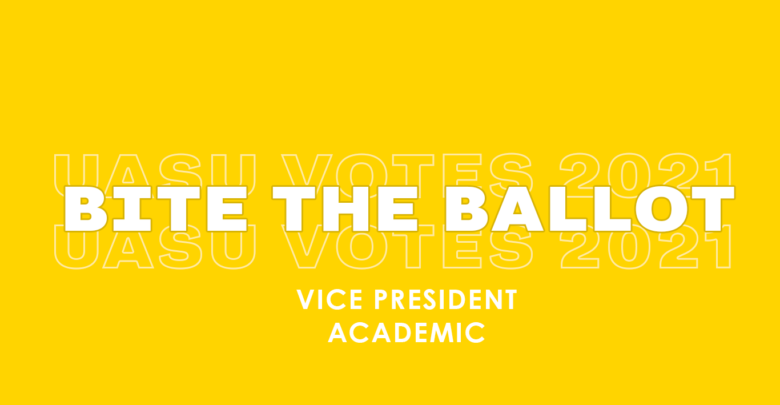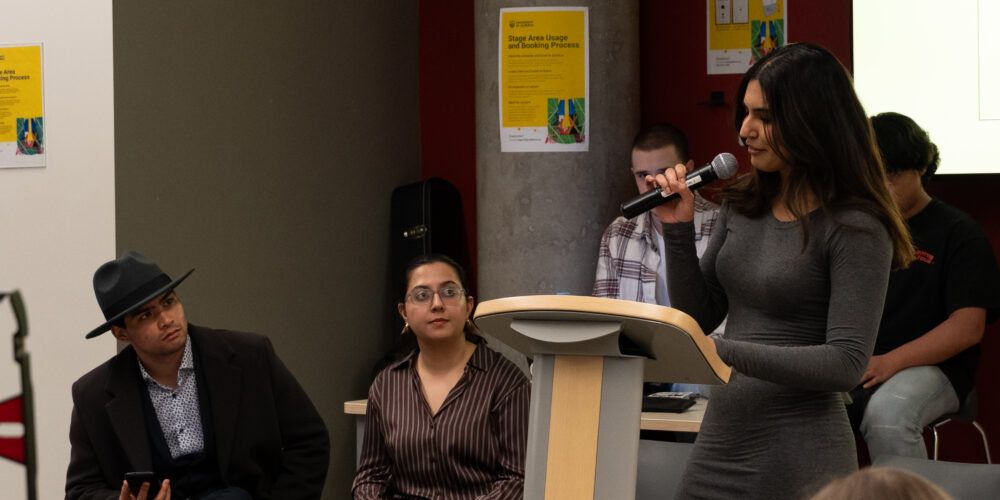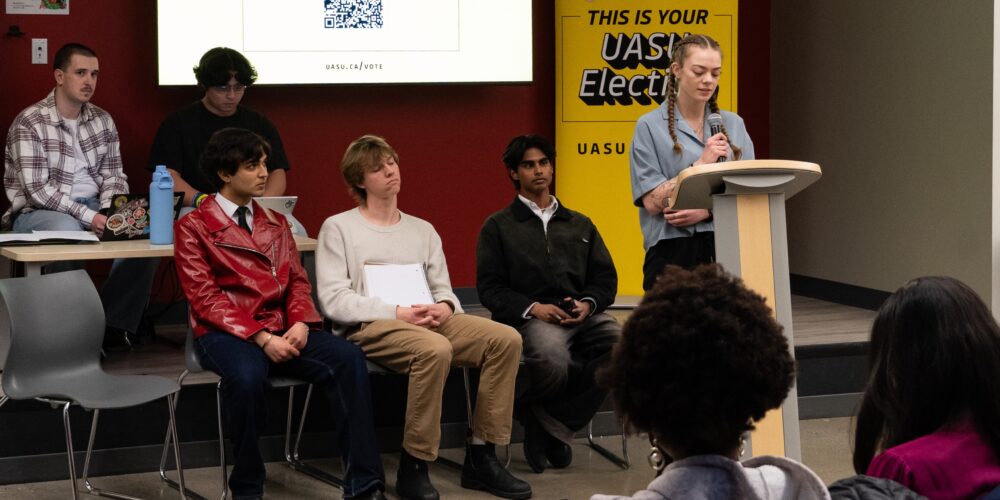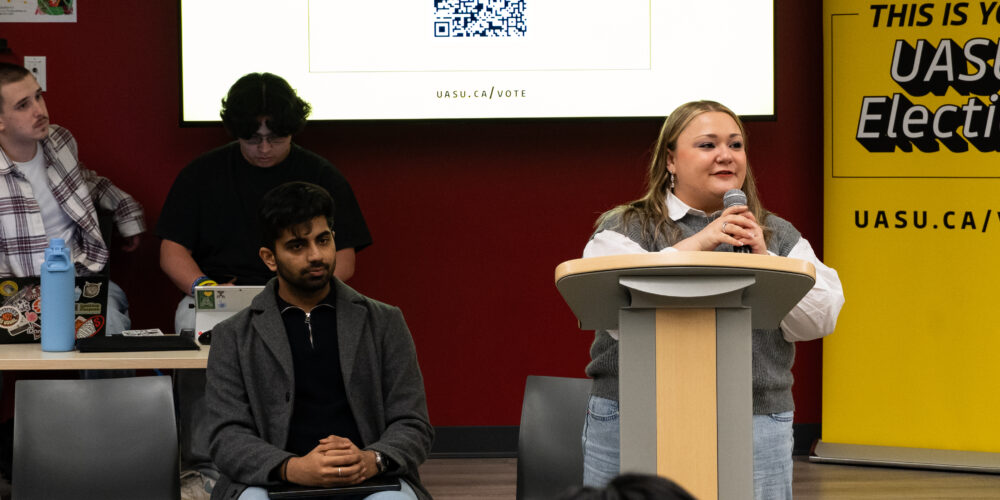Bite the Ballot: Vice-President (Academic)
How should the student body vote, and how will they?
 Pia Co
Pia CoThe Vice-President (Academic) is responsible for all advocacy related to academic issues at the University of Alberta. This position sits on many board and committees, including the Students’ Union Policy Committee, the General Faculties Council, multiple GFC standing committees and subcommittees, the Council of Faculty Associations and its working groups and more. It works closely with all of the student faculty and department associations to ensure that students receive the best possible education at the University of Alberta.
This year’s vice president academic (VPA) race is uncontested, and has a heavy focus on student voice, empowerment, and accessibility.
Abner Monteiro
Abner Monteiro is a fifth-year kinesiology student and current kinesiology, sport, and recreation councillor for Students’ Council. He also serves as the chair for the SU policy committee, and is this year’s uncontested candidate running for vice-resident (academic), or VPA.
Monteiro makes it clear that his campaign is centred around advocating for student voices to be heard, and centres his ideas around consultation and collaboration.
In his platform, Monteiro has three major focuses: improving academic support for students, empowering student voices, and a push for diverse learning opportunities. Through election forums, Monteiro has made it clear students are at the centre of his campaign. For VPA, this is essential: students want to ensure they are getting the best education and that when they express concerns, these concerns are actually being acknowledged. Through Monteiro’s platform, it is clear he wants to fight for students to get just that.
Monteiro’s focus on empowering student voices focuses heavily on collaborations with Student Representative Associations (SRAs), organizations which are responsible for advocating on behalf of a unique group on campus. In the majority of the election forums, Monteiro would always ensure to mention his desire to work with SRAs and amplify their voices. This would ensure that many students from different backgrounds would have a way to express their concerns regarding their education. Collaboration and consultation is the best way to fix the problem of students feeling like they are not being listened to.
Promising a seat at the table is a reasonable approach, one that can be done in the time that VPA sits on the SU. When a hand is reached out to students who feel as though they’ve been left behind, it’s an essential way to affirm students that someone will listen to them.
Along with Monteiro’s strong push for collaboration among SRAs and faculty associations, he has a strong platform regarding improving student academic supports. This includes making textbooks more affordable, educating students on their rights, and improving accommodations. These are all essential for students to be successful with their education, as no student should be left behind due to not being able to afford a textbook.
Beyond this, Monteiro’s desire to make the Charter of Student Rights and Responsibilities (CSSR) more accessible for students is an excellent proposition. Within Monteiro’s platform for academic support, the lessening and alternating textbooks is an excellent idea, though this may be hard to implement, due to things like recent budget cuts.
That leads to the one negative to Monteiro’s campaign. Though what he offers would be great to benefit students, some of his ideas may be hard to actually implement. One of these being wanting to expand CampusBRIDGE. Though this is a great idea to amplify the reach of CampusBRIDGE so students know exactly which Work Integrated Learning (WIL) opportunities would aid them with their education, this may be hard to do.
Changing a website managed by the university is a large task, and given that BearTracks just got its first update in ten years, it does not seem likely to be accomplished during his term. Laying the groundwork down for those who come after him may be more beneficial, but it is still something that is a good idea, just held back by how much he would need to do to accomplish this task.
Who will win and who should win?
I believe that Monteiro will win this race. From his forum performances and platform, it’s clear he wants to help amplify student voices. Given our last VPA was elected on a promise to help increase students’ participation in governance, I expect the student body to welcome this approach to advocacy and elect Monterio based on these ideas.
Overall, I also believe Monteiro should win. Despite some promises seeming far-fetched, the majority of his platform focusing on student collaboration is reasonable and tackles a prominent issue regarding student engagement and the SU.
This is not because he’s the only candidate, either — he shows genuine concern for students and genuine desire for student advocacy. Ensuring student voices are actually heard is one of the most important aspects for a student leader, and it’s clear Monteiro wants this to happen. His platform revolves around student advocacy, amplifying student voices, and clear desire to ensure students have the best education possible. With no VPA, we would not have any of the great ideas Monteiro brings to the table. For that, he’s worth voting for.
The Gateway as an apolitical organization does not endorse candidates. Authors who write “Bite the Ballot” pieces follow the races or referendums that they write about with the expectation they attend or watch every forum and read all relevant campaign materials in their entirety. The views expressed in this piece reflect the author’s best informed judgment.




